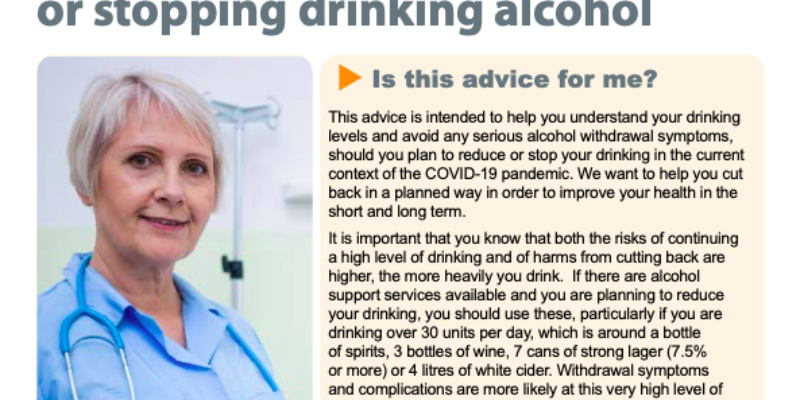
As the COVID-19 pandemic hit, Scottish Health Action on Alcohol Problems (SHAAP) – a partnership of the Medical Royal Colleges in Scotland and the Faculty of Public Health – quickly recognised that this would exacerbate risks for heavy drinkers and reduce support available, placing a marginalised group under even more pressure. Our poster showcases the advice that SHAAP developed for heavy drinkers thinking about cutting back or stopping drinking alcohol during the pandemic, while alcohol services were disrupted and halted.
Heavy drinkers face significant, wide-ranging health harms from their drinking, including liver disease, mental health issues, and increased risk of several cancers. Heavy drinkers also face stigma and marginalisation and the health risks posed by COVID-19 to heavy drinkers meant it was imperative to put in place some support for this group in lieu of the services they may have accessed pre-pandemic.
Our practical guide enables heavy drinkers to self-manage alcohol reduction as safely as possible. It first discusses alcohol withdrawal – the physical and emotional symptoms that can occur when heavy drinkers reduce their alcohol consumption – including who is at risk of withdrawal, symptoms of withdrawal, and how to get help. It then goes step-by-step through:
- How to assess alcohol consumption, including using a drinks diary and drinks calculator
- Planning for alcohol detox or reduction, including setting a date to start reducing consumption, letting trusted people know your plans, and having enough food and other necessities in the house
- Reducing and/or stopping drinking, including the importance of setting a manageable pace to avoid a dangerous withdrawal, with an explanation of what a typical eight-day period for alcohol detox looks like
- Making other plans, including eating well and accessing support from addiction services/organisations
The guide signposts to mutual aid and support groups and sources of further guidance during the COVID-19 pandemic, such as how to look after your mental health.
Recognising the urgency of the situation, SHAAP staff and clinical experts in our Steering Group rapidly produced this new advice in March 2020 ready for use, with a professionally designed version being made available the following month. The advice was developed in consultation with a wide range of clinicians and to ensure it met the needs of people who drink heavily. We co-produced it with people with lived experience: we believe that the voice of people experiencing or who have experienced alcohol problems is vital when developing policy and practice.
Our guidance is a clear example of how impactful, well-informed and quick-to-adapt the third sector is when faced with a dramatically changing situation. It has been extensively used and shared, with over 5,000 downloads from the SHAAP website alone. The ever-growing number of downloads suggests that our guidance continues to meet clinical and social needs, which have remained high throughout the pandemic. The guide is also included in the alcohol section of NHS inform’s website.
As evidence emerges of polarisation in drinking behaviour during the pandemic, with heavier drinkers thought to be drinking more than pre-pandemic, it’s clear that more needs to be done. SHAAP will continue to work with stakeholders to ensure relevant signposting and guidance is provided in ways that suit heavy drinkers. This aligns with key aims for SHAAP: supporting the delivery of quality alcohol treatment services and supporting recovery.
Our advice for heavy drinkers thinking about cutting back or stopping drinking is available from: https://shaap.org.uk/downloads/reports-and-briefings/240-covid-advice-for-heavy-drinkers.html
SHAAP also produced recommendations for alcohol services during the pandemic.
Chris Graham is the Research and Projects Officer at Scottish Health Action on Alcohol Problems (SHAAP)
View the SHAAP Poster for the VHS Annual Conference Poster Competition here.

Website: www.shaap.org.uk Twitter: @SHAAPALCOHOL
